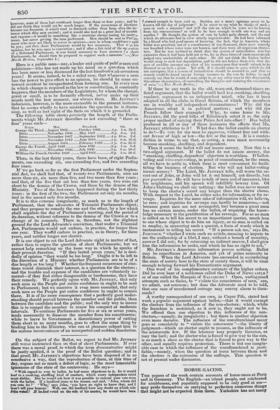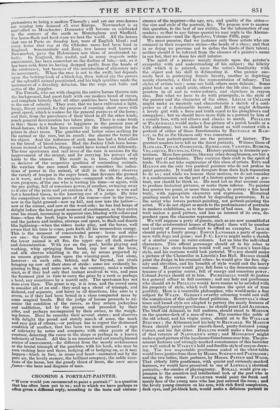HORSE-RACING.
THE papers of the week contain accounts of horse-races at Paris and in Germany. The English—an island people, not celebrated for nimbleness, and popularly supposed_ to be only good at sea— may pride themselves on carrying to perfection numerous things that might not be expected from them. Yorkshire has not many 'pretension. s to being-a modern cr. hessaly ; and yet our race-horses are cenung into demand et over Europe. Newmarket is as unrivalled as Manchester: ; Doncaster will become as celebrated in the corners of the earth as Birmingham and Sheffield. For horse-flesh and hard-ware we beat the world. All the horses that ran at Paris on Sunday last, were of English blood ; and every horse that ran at the Oldesloe races had been bred in England. Sornnambule and Zany, two horses well known at Newmarket, gave the Holsteiners new ideas of accelerated ve locity. In England, this useful, and in many respects noble amusement, has been somewhat on the decline of late,—not, as it has been said, from its having dropped partly from the hands of the aristocracy, but because of the introduction of chicanery into its movements. When the race is not to the swift, but depends upon the betting-book of a black-leg, then indeed are the powers of the splendid animal prostituted, and his high qualities made the instrument of a dazzling delusion, like the cups and balls and antics of the juggler. The French, who see with chagrin the native horses thrown into the background, find great fault with our modern breed of racers, and complain bitterly that all other qualities have been sacrificed to the one of celerity. They aver, that we have cultivated a light, leggy, flimsy animal, for the purpose of running short races with great speed, which is useless for the general purposes of the horse; and that, from the prevalence of their blood in all the other kinds, much general deterioration has taken place. There is some truth in this : there is a tendency to legginess in the present race of blood-horses, which has been caused by the competition for the prizes in short races. The gambler and better cares nothing for the animal or the race, but its result : the shorter the better for his object. And the influence of such men has had a fatal effect on the breed of blood-horses. Had the Jockey Club been horselovers instead of betters, things would have turned out differently. The true sportsman and real lover of the race is anxious for the improvement of the animal, and for carrying his powers of all kinds to the utmost. The result is, to him, valuable only as decisive of the respective qualities of contending animals. He watches the race round the course; considers the indications of power in the animal, of skill in the rider; observes the variety of temper in the eager beast, that devours the ground as it were, and wastes its energies—compared with the steady, even progress, of the one who is waiting his time—or again, with the gay gallop, full of conscious power, of another, swinging away as if sure of the prize and yet careless of it. The race is won and lost a hundred times, to the knowing eye of a judge. He tries the competitors in various parts of the course—now in the heavy, now in the light ground—now up hill, and now into the hollow— now at the corner, and now at the wood-side: he has had heaps of delight before the last grand moment of excitement, as they arrive near his stand, increasing in apparent size, blazing with colour and foam—when the hoofs begin to sound like approaching thunder, and the jackets and bridles, stirrups and spurs, to flash and dazzle like lightning—when the riders make play, and the horse, well aware that his time is come, puts forth all his tremendous energy. This is the moment of concentrated power: horse and rider are one : the Centaur seems to fly : he spurns the ground— the lower animal is all fire, the upper one all dark resolve and determination. With eye on the goal, bridle playing and working, whip springing from hand, cap low on the brow, and silk sleeves whistling in the air, he seems projected by an unseen gigantic force upon the winning-post. Not alone, however : on each side, behind, and far beyond, are rivals bringing up now all their store of stride : some are evidently beginning to flag, and some now, on the contrary, make a sudden start, as if they had only that instant resolved to win, and pass the foremost just in time to carry the prize by a neck or perhaps a head, nay sometimes by a nostril only. The sportsman has not done even then. The game is up, it is true, and. the crowd seem to consider all at an end they send up a shout of triumph, and disband, and separate, and hurry in all directions, like ants in a storm, as if they had been bound in a close compacted mass by some magical bonds. But the judge of horses proceeds to examine the condition of the racers, as they return jockeyless and saddleless, led by the groom and preceded by their rider, and perhaps accompanied by their owner, to the weighing-house. Here he remarks their several states ; and observes with delight the proud and stately march of some, the meek and easy gait of others,—or perhaps has to regret the distressed condition of another, that has been too much pressed; a sign of inferiority he notes and compares with other points of the creature, detecting the cause in the shape or perhaps in a known inferiority of breed. All this is an innocent and not unenlightened source of amusement,—far different from the moody recklessness or the brutal triumph of the gambler, with his book, who may be seen rushing here and there, hedging off or hedging on, as it may happen—black in face, in name and heart—animated not by the pure air, the lovely scenery, the brilliant company, the noble exertions of the horse, but the greedy thirst of lucre, the auri sacra James—the bane and disgrace of man.



























 Previous page
Previous page